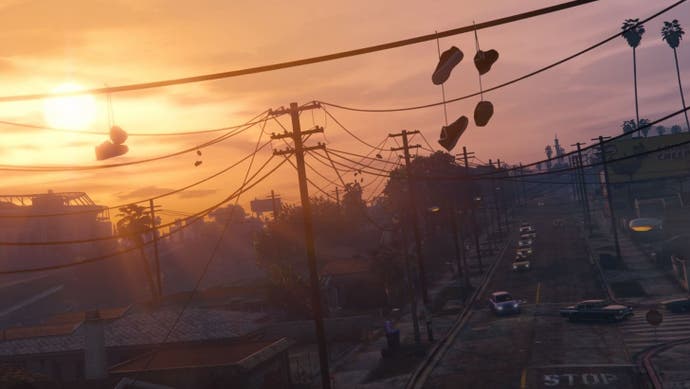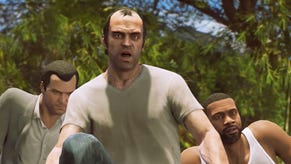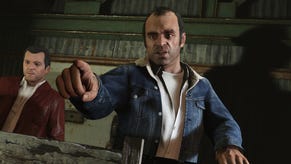Grand Theft Auto 5 is so much more than its misanthropy
Rockstar's megagame is easy to reduce to its teenage peevishness - we should resist the urge.
Eight-and-a-half years on from Grand Theft Auto 5's release at the twilight of the Xbox 360 and PlayStation 3 era, the world has changed. Games have changed, humour has changed, the public has changed, the developers have changed - not just those who worked in GTA5 but, more than likely, the makeup of developer Rockstar North itself. And in the ensuing years of service-game evolution and osmosis, the game's more visible half, GTA Online, has changed an awful lot too.
Against all that, GTA5 itself - the base game, its story of post-financial crisis American impotence and ennui, and its peevish, sporadically offensive world - seems oddly static, a stoically flash-frozen slice of time, pickled and jarred and perfectly preserved, waiting for you to return.
The temptation, justifiably, is to look at GTA5's dated, equal-opportunity-roasting approach to humour, the uniquely teenage smugness and simplicity of its worldview - the kind we all probably had at some point, where everyone but you's a fool or a sheep, especially your parents, your teachers, the politicians, the cops - and reduce the entire game to just that. To start and stop with the way it chases Scorsese and misses The Sopranos (Michael's mid-life angst is clearly inspired by Tony S, but GTA5 itself often feels like Anthony Jnr. after he discovers Nietzsche and responds to getting caught driving his parents' car with: "God is dead." The Joey Barton phase of existential philosophy).
The temptation, basically, is to label it as misanthropic and move on - especially in the face of the kind of breathless, exceptionalist coverage Rockstar games can inspire (recall the rise-and-fall of the word "filmic"). But we shouldn't. Yes, Grand Theft Auto 5 is misanthropic and cynical and tonally all over the place, but it's also much more than that.
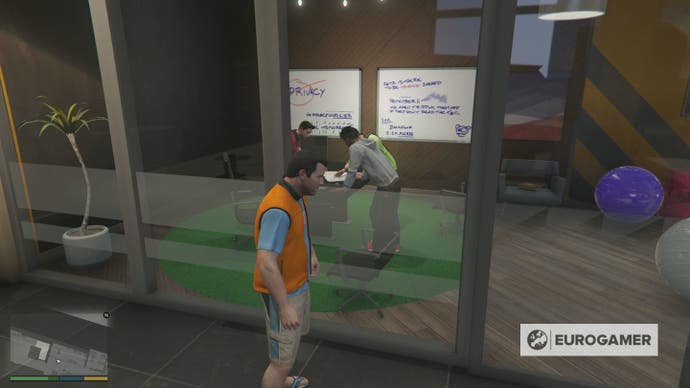
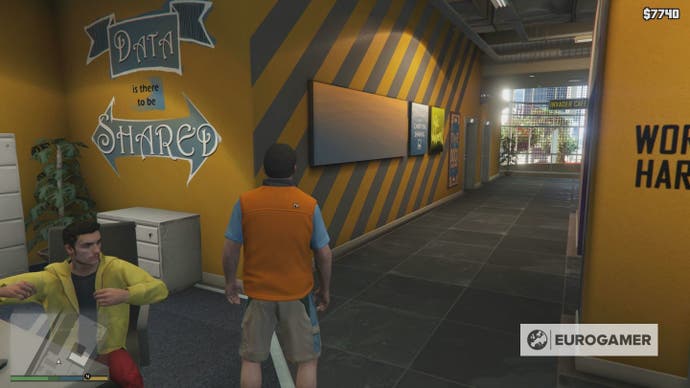
It's magic, actually. Games are about places more than anything else, the complete ground-up construction of a universe and the magic of making you believe you're really in it, and GTA5 still has the greatest sense of place of anything I've played. Los Santos is conjured up through Rockstar's superlative attention and craft - craft that comes at an extraordinary human cost, lest we forget. There are really two ways games do the sense-of-place thing. One is that brushstroke, pixel-arty method of minimalism, impressionism, conceptualism - the games that give you just enough to subconsciously build the world yourself in your own head, and nothing more. The other is the polar opposite: maximalism and literalist detail. This way says the world feels more real because it just clearly looks and sounds more like the real thing. This is Rockstar's approach and the approach of almost every other megabudget game in the years after GTA5, driven forwards by more powerful consoles, more efficient engines, exponentially more money in the system.
But GTA5's size is focused and deliberate, targeted detail over detail for its own sake. Games like GTA give the impression of a developer that wants to include everything, to recapture the world exactly as it is, but GTA itself doesn't. It wants to draw your eye, to highlight and direct. It's ingrown hairs on Michael's bare calf, interactions in the street, different police responses depending on where you are. Even the way Michael gets up from a sunlounger in one early cutscene stands out to me now, returning to the story. He gets off that sunlounger and stumbles, just catching his back foot on it as he tries to climb across. It's barely there, not obvious enough to be a joke. It's just a little touch, a human quirk of motion capture and animation, a step away from catch-all photorealism and into observation.
This is where the people at Rockstar are masters. Their ability to see the world in a way that recognises little things and to focus on them, the incidental moments that scream humanity when you put them in a game - a game that, in GTA's case, is also viciously inhuman at the same time. This is where GTA's world - all the more of a systemic marvel in the wake of the Cyberpunks and Watch Dogs that came since - steps out of its machine-like ruleset to feel genuinely alive. It's where its soundtrack goes beyond a collection of bangers and into something assembled, by a team of half a dozen people, with extraordinary craft.
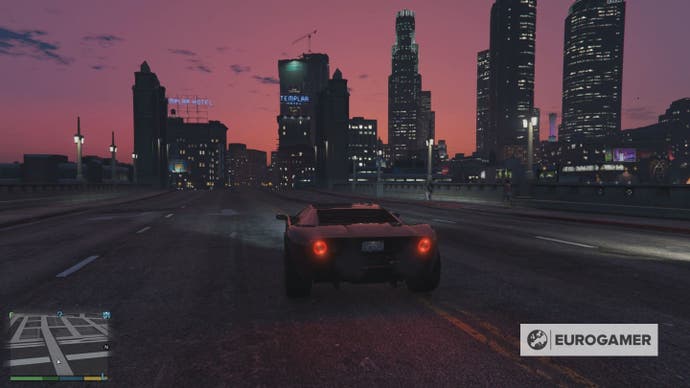
GTA's radio stations are infamous for their pastiche of talk radio and news (albeit not without the odd direct hit; one news broadcaster after I finished a particularly violent Franklin mission: "The police have called for calm, and responded by flying helicopters over poor neighbourhoods all night long in a show of community spirit.") But beyond that they're something human, sincere, true. To drive through parts of Los Angeles listening to N.W.A., then Waylon Jennings, then The Cult, to catch a sunset to Queen's Radio Gaga, goof around to The Petshop Boys' West End Girls, stumble into the Latinx electronica of East Los FM or sink into the wavey, operatic, dream-big vibes of Small Faces's Ogden's Nut Gone Flake is to do something more than just role play or poke fun. It's to feel the extraordinary pluralism of a place like Los Angeles, to feel, by video game standards, remarkably alive.
It goes the same mechanically. We can probably blame Grand Theft Auto for the way each open world since seems to think it must have in-universe mini-games, a space for you to go play some space-tennis or fantasy-chess or do a race. But activities aside, where every successor has gone the other way into systems kleptomania, GTA is paper thin. You do stuff to earn money to buy guns and clothes and cars; don't get caught; don't get shot. That's your lot. No crafting, no skill trees, no looting in the modern sense. No grapple hooks.
It's light like this because it knows to get out of its own way. With the gameyness of GTA barely there, you're free to enjoy it as it is, to get that mystical, intrinsic motivation you hear about on GDC slides and game dev blogs. This is the motivation to keep doing something because you like doing it, not because you want a reward or because the game keeps giving you one regardless via the fizzing fireworks of a Rare Drop or freshly filled Level Up bar. Just play. Just do what you want.
This is the magic of it and the point of it; this is what GTA really is. All of its music and weather and yes, its tone. Its glossy cars and open-collar suits and beaches, boulevards, palm trees, mountains, deserts, people, roads. All of it screams at you. You can do what you want. All the irony of its lampooning, of freedom-worship and greed and broken American dreams, is right there of course, but irony be damned. The magic of Grand Theft Auto is the tension of it, the way it's pointing at people, laughing, mocking, poking fun, all the while it's building its own profoundly human world.
